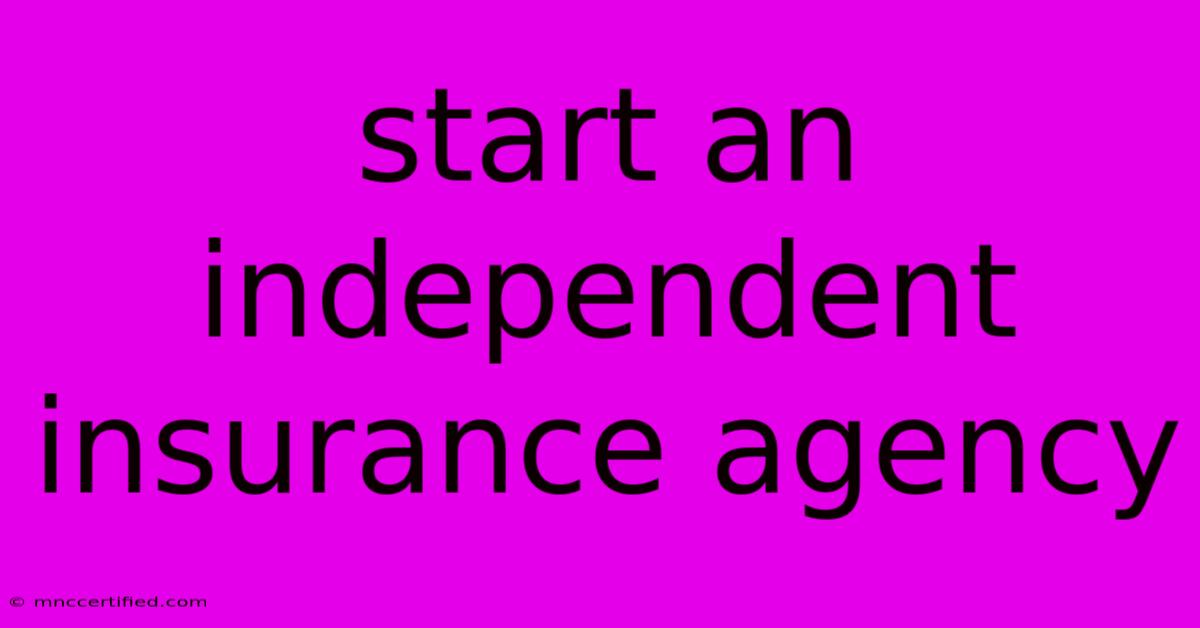Start An Independent Insurance Agency

Table of Contents
Start an Independent Insurance Agency: A Comprehensive Guide to Success
Starting an independent insurance agency can be a rewarding and lucrative venture. You'll be your own boss, helping individuals and businesses find the insurance coverage they need. But before you take the plunge, it's crucial to understand the intricacies of this industry and develop a solid plan for success.
This comprehensive guide will walk you through the essential steps of starting an independent insurance agency, covering everything from market research and licensing to building your client base and managing your business.
Step 1: Market Research and Business Planning
Understanding Your Target Market:
- Who are your ideal clients? Are you focusing on individuals, families, small businesses, or large corporations?
- What are their specific insurance needs? This could include home, auto, health, life, business, or other specialty insurance products.
- What are their demographics and geographical location? This will help you tailor your marketing efforts and identify competitors.
Competitive Analysis:
- Identify your competitors. Who are the other insurance agencies operating in your target market?
- Analyze their strengths and weaknesses. What are they doing well? Where do they fall short?
- Determine your unique selling proposition (USP). What will set your agency apart from the competition?
Develop a Business Plan:
- Define your mission and vision. What are your long-term goals for your agency?
- Outline your services. What types of insurance products will you offer?
- Project your financial projections. Estimate your revenue, expenses, and profitability.
- Create a marketing strategy. How will you attract and retain clients?
Step 2: Obtain the Necessary Licenses and Certifications
- State Licensing: You'll need to obtain an insurance agent license in the state(s) where you intend to operate. This typically involves passing an exam and meeting certain requirements.
- Insurance Producer License: This is a broader license that allows you to sell various types of insurance.
- Continuing Education: You'll need to complete ongoing education courses to maintain your licenses.
Step 3: Choose an Agency Structure and Business Model
Sole Proprietorship: This is the simplest structure, where you operate as an individual.
Partnership: Two or more individuals form a partnership, sharing profits and liabilities.
Limited Liability Company (LLC): This structure offers limited liability protection, separating your personal assets from the business.
Choose your business model:
- Captive agency: You represent one specific insurance company.
- Independent agency: You represent multiple insurance companies, offering clients a wider range of options.
Step 4: Secure Funding and Set Up Your Agency
- Investment Capital: You'll need to invest in initial setup costs like office space, technology, and marketing materials.
- Funding Sources: Consider personal savings, loans, or investor funding.
- Business Insurance: Protect yourself with liability, property, and cyber insurance.
- Technology: Invest in an insurance management system to streamline operations, track client data, and manage policies.
Step 5: Build Your Client Base and Network
-
Marketing and Sales:
- Online Presence: Create a professional website and social media presence.
- Networking: Attend industry events, join local business groups, and build relationships with other professionals.
- Referrals: Encourage satisfied clients to refer friends and family.
- Targeted Advertising: Utilize online and offline advertising channels to reach your ideal audience.
-
Client Service:
- Excellent communication: Respond promptly to inquiries and provide clear, informative advice.
- Personalized service: Understand your clients' needs and offer customized solutions.
- Ongoing support: Be available to answer questions and address concerns throughout the policy lifecycle.
Step 6: Manage Your Agency and Grow Your Business
- Financial Management: Track revenue, expenses, and profitability. Invest in financial software to automate tasks and gain insights.
- Compliance: Stay up-to-date on industry regulations and best practices.
- Continuous Improvement: Seek opportunities to improve your processes, enhance client service, and expand your product offerings.
- Employee Development: If you hire staff, invest in their training and development to ensure they provide excellent customer service.
Key Considerations for Success
- Strong Work Ethic and Dedication: Starting and running an agency requires hard work and commitment.
- Passion for Insurance: You'll need a genuine interest in helping people find the insurance they need.
- Sales and Marketing Skills: You'll need to be adept at selling insurance products and marketing your agency.
- Financial Management: Understanding financial statements, managing cash flow, and making informed financial decisions is essential.
- Staying Current: The insurance industry is constantly evolving. Stay informed about new products, regulations, and technology trends.
Starting an independent insurance agency can be challenging, but the rewards are significant. By carefully planning, obtaining the necessary licenses, and developing a strong business model, you can position yourself for success in this dynamic and ever-growing industry.

Thank you for visiting our website wich cover about Start An Independent Insurance Agency. We hope the information provided has been useful to you. Feel free to contact us if you have any questions or need further assistance. See you next time and dont miss to bookmark.
Featured Posts
-
Remembrance Sunday 2024 Meaning And History
Nov 10, 2024
-
Bondo Glazing And Spot Putty Dry Time
Nov 10, 2024
-
Insl X Stix Waterborne Bonding Primer
Nov 10, 2024
-
Pak Vs Aus Series Result Pakistan Wins
Nov 10, 2024
-
Liability Insurance For Social Worker
Nov 10, 2024